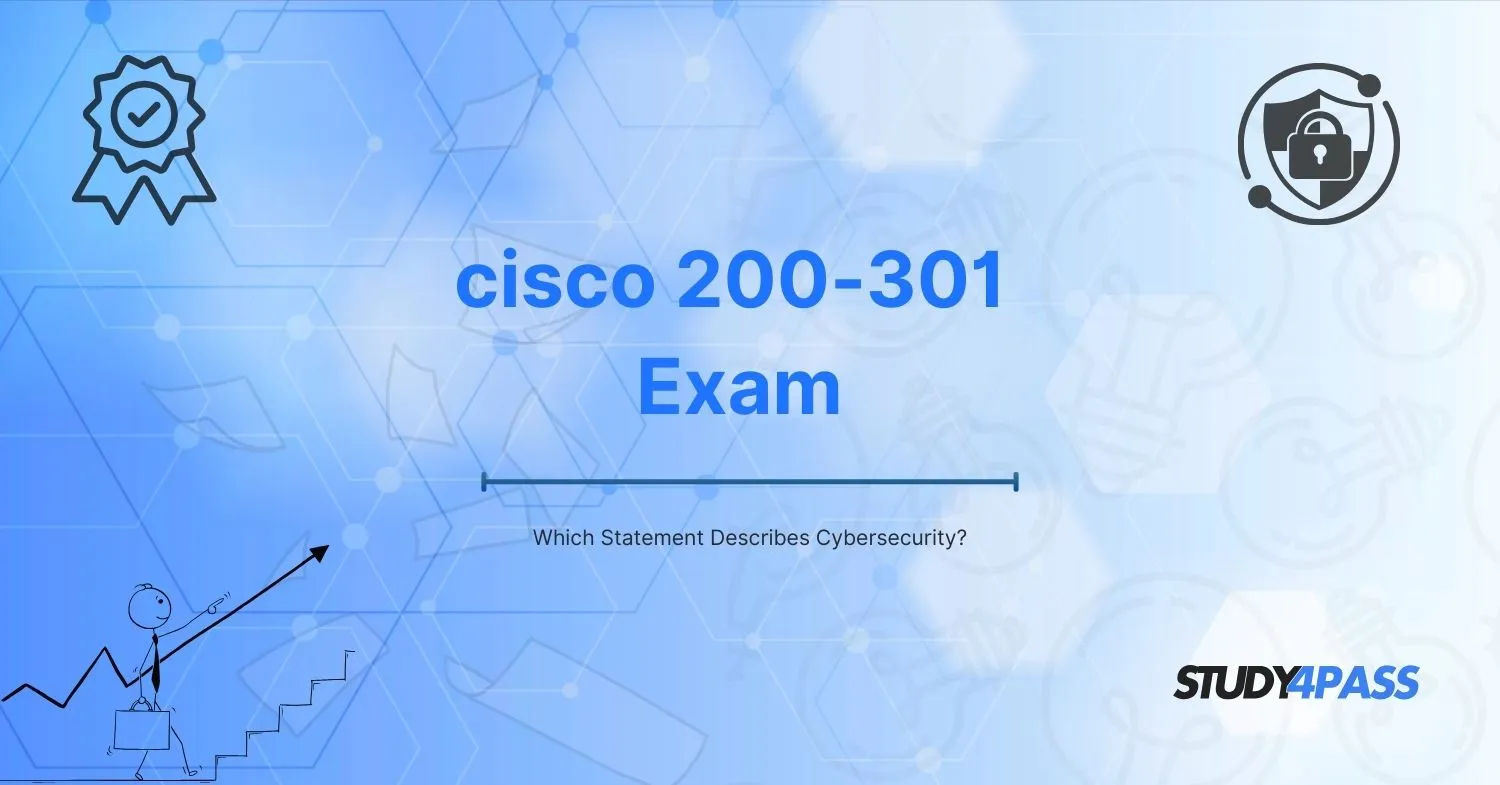Introduction To Cisco 200-301 Exam
Cybersecurity is a critical aspect of modern IT infrastructure, protecting systems, networks, and data from digital threats. For those preparing for the Cisco 200-301 exam, understanding cybersecurity fundamentals is essential. This blog will explore which statement describes cybersecurity accurately, its importance, key concepts, and how it relates to the Cisco 200-301 certification.
If you're aiming to pass the Cisco 200-301 Exam, platforms like Study4Pass offer valuable resources to help you succeed. Let’s dive into the world of cybersecurity and its relevance to your certification journey.
What is Cybersecurity?
Cybersecurity refers to the practice of protecting internet-connected systems—including hardware, software, and datan from cyber threats. These threats can include hacking, phishing, ransomware, and other malicious activities.
Which Statement Describes Cybersecurity?
Several statements can describe cybersecurity, but the most accurate one is:
Cybersecurity is the practice of defending computers, servers, mobile devices, electronic systems, networks, and data from malicious attacks, unauthorized access, and data breaches.
This definition aligns with the objectives of the Cisco 200-301 exam, which covers network security fundamentals.
Why is Cybersecurity Important?
With increasing digital transformation, cybersecurity has become a necessity. Here’s why:
1. Protects Sensitive Data – Businesses and individuals store vast amounts of confidential data online. Cybersecurity ensures this information remains secure.
2. Prevents Financial Loss – Cyberattacks can lead to significant financial damage due to theft, fraud, or operational disruptions.
3. Maintains Business Reputation – A security breach can harm a company’s reputation, leading to loss of customer trust.
4. Ensures Regulatory Compliance – Many industries require compliance with cybersecurity regulations (e.g., GDPR, HIPAA).
5. Supports National Security – Cyber threats can target critical infrastructure, making cybersecurity vital for national defense.
For Cisco 200-301 exam candidates, understanding these aspects is crucial since the exam tests knowledge of network security protocols and best practices.
Key Concepts of Cybersecurity
To excel in the Cisco 200-301 exam, you must grasp these cybersecurity fundamentals:
1. Confidentiality, Integrity, and Availability (CIA Triad)
- Confidentiality – Ensures data is accessible only to authorized users.
- Integrity – Maintains data accuracy and prevents unauthorized modifications.
- Availability – Ensures systems and data are accessible when needed.
2. Types of Cyber Threats
Malware – Malicious software like viruses, worms, and trojans.
Phishing – Fraudulent attempts to steal sensitive information via emails.
Ransomware – Encrypts data and demands payment for decryption.
DDoS Attacks – Overwhelms a network with traffic, causing downtime.
3. Network Security Measures
- Firewalls – Acts as a barrier between trusted and untrusted networks.
- Intrusion Detection Systems (IDS) – Monitors network traffic for suspicious activity.
- Encryption – Secures data by converting it into unreadable code.
- Access Control – Restricts unauthorized users from accessing resources.
These concepts are integral to the Cisco 200-301 Certification, which tests your ability to implement and troubleshoot security measures.
How Does Cybersecurity Relate to the Cisco 200-301 Exam?
The Cisco 200-301 exam (CCNA) validates your skills in networking fundamentals, including security. Here’s how cybersecurity fits into the exam:
1. Security Fundamentals (25% of the Exam)
- Understanding security concepts like threats, vulnerabilities, and exploits.
- Implementing authentication, authorization, and accounting (AAA).
- Configuring basic firewall and VPN settings.
2. Network Access Control
- Securing network devices using passwords, SSH, and role-based access.
- Implementing port security and 802.1X authentication.
3. Threat Mitigation
- Identifying common attack vectors (e.g., man-in-the-middle, brute force).
- Using ACLs (Access Control Lists) to filter traffic.
By mastering these topics, you’ll be well-prepared for the Cisco 200-301 exam and real-world security challenges.
How Study4Pass Helps You Prepare for the Cisco 200-301 Exam
Preparing for the Cisco 200-301 exam requires structured learning and practice. Study4Pass offers:
- Comprehensive Study Guides – Covering all exam objectives, including cybersecurity.
- Practice Tests – Simulating real exam scenarios to test your knowledge.
- Hands-On Labs – Providing practical experience with network security configurations.
- Expert Support – Access to instructors for doubt resolution.
With Study4Pass, you can confidently tackle the Cisco 200-301 exam and gain expertise in cybersecurity.
Conclusion
Understanding which statement describes cybersecurity is fundamental for IT professionals, especially those pursuing the Cisco 200-301 certification. Cybersecurity protects systems from threats, ensures data integrity, and is a critical component of the CCNA exam.
Special Discount: Offer Valid For Limited Time “Cisco 200-301 Exam”
Sample Questions for Cisco 200-301 Exam Prep Practice Tests
Actual exam question from Cisco's 200-301 Exam
Which protocol is used by Cisco devices to automatically assign IP addresses, subnet masks, and default gateways to hosts in a local network?
A) DNS
B) SNMP
C) DHCP
D) OSPF


